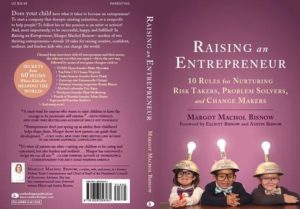Raising an Entrepreneur by Margot Machol Bisnow (Book Excerpt)
 Rule 3: Don’t Worry About A’s
Rule 3: Don’t Worry About A’s
Schools Don’t Always Nurture Entrepreneurs
Some children who grow up to become entrepreneurs have habits that most schools don’t value. They question the rules and challenge authority. They want to do things their own way. They get bored and lose focus when the task at hand doesn’t interest them. And what does that mean?
- It means they often aren’t happy in school.
- It means some teachers may not like them very much.
- It means nobody at school is mentoring them, because they don’t see how special they are.
- It means they aren’t getting a lot of positive feedback at school.
Schools, of course, teach necessary academic and social skills, but to some extent they also reward behavior that is diametrically opposed to what’s needed for entrepreneurial success. And, as one mom I talked with pointed out, schools often put more emphasis on remediating kids’ weaknesses than they do on finding and supporting kids’ strengths. That approach can be devastating to a youngster with an entrepreneurial mind-set, a kid who learns in ways that are determined by her passions, not by an academic schedule, a teacher’s checklist, or a standardized test.
Some children do have serious learning issues. They may need medical attention or even a special type of school. But other kids, particularly boys, may simply have a lot of energy. After all, five-year-olds haven’t always been labeled “hyperactive” or been medicated with Ritalin or made to feel there was something wrong with them just because they didn’t feel like sitting still in a circle and hanging on their teacher’s every word.
Benny Blanco: Not a Problem
Benny Blanco (whose given name is Benjamin Levin) is one of the top pop songwriters and music producers in America. He was one of three people named Songwriter of the Year at the 2013 BMI Pop Music Awards. He’s a multiplatinum songwriter who has written and produced over fifteen number-one hits, such as “Moves Like Jagger.”
Benny and his older brother Jeremy (who now manages songwriters, producers, and artists with Benny) were born in Plano, Texas, and moved with their parents to L.A., where Benny went to a Montessori preschool. Then the family moved to Reston, Virginia, outside D.C., where Benny, by then a kindergartner, enrolled in public school. Their mother, Sandy, a social worker, is the admissions director at a senior assisted living facility.
Sandy told me that his kindergarten teacher wasn’t happy with his inability to sit quietly in a circle. Sandy told me, “His teachers used to call me every day complaining that Benny couldn’t sit still.” ”
Sandy’s response was succinct: “So?”
This, of course, is not a normal parental response. Most parents who receive even a single report like that, even for a child still in kindergarten, quickly fall into line and try to “fix” the “problem.” But Sandy didn’t mind that Benny was different, and her response to his kindergarten teacher is typical of how she raised her son for the next twenty years. When Benny couldn’t do something (and often he couldn’t), or when he didn’t conform to the expected norms, she said, “So?” And she meant it. Then she focused instead on what Benny was doing well.
Unsurprisingly, Benny was later diagnosed with ADHD. And so Sandy, who had been willing to stand up to Benny’s kindergarten teacher, now also spent many hours trying to help him. She took him to doctors, to meetings for kids with ADHD, to meetings with his teachers and counselors in the hope of getting him more engaged in school, and to special meetings where she fought for kids with ADD to be allowed extra time on standardized tests. And she kept trying to redirect his boundless energy—into the theater, into music lessons—even listening to the lyrics and music he was writing, including rap music, which she hated.
What do you think of when you hear that a twenty-five-year-old has fifteen pop hits under his belt? You may think he’s a musical prodigy, or that he has industry connections, or that something extraordinary must have catapulted him to the top of his field. But Benny was anything but a child prodigy, and he didn’t have an easy go of it. What was extraordinary was how his mom anchored him.
What Sandy did was assure Benny that there are more important things than mastering a specific skill by a specific deadline, and she did not question him for not conforming. In fact, she sent him a reassuring message when she reacted to the problem” by saying “So?” It was clear that she really believed what she was saying, which meant that Benny believed it, too. How many careers require the skill of sitting quietly in a circle? How many careers require the fine-motor skills of coloring between the lines and writing neatly?
Sandy’s unwavering belief in Benny gave him permission to feel good about himself even when he came in for criticism at school. And later on, when she supported his songwriting talent, she sent him that important message again and again. Benny’s mom didn’t know it at the time, but even when he was five years old, she was laying the foundation for his future success by not letting him see his perceived deficits as problems. Incidentally, by the time Benny finished kindergarten, his teacher had come to recognize that he was a truly special kid. She told Sandy that she wouldn’t be surprised if he became president one day.
Today, even though Benny didn’t graduate from college, he’s a frequent guest lecturer at the Clive Davis Institute at NYU’s Tisch School of the Arts. As Sandy told me, Benny likes to say that he always knew he’d do something with music if he just kept at it and was annoying enough.
Dhani Jones: Stealth Superstar
Dhani Jones, a former All-American college football linebacker, was Tom Brady’s teammate at the University of Michigan, which was also the alma mater of Dhani’s mom, Nancy, an anesthesiologist. Dhani Jones and Tom Brady were an unstoppable combination for the Wolverines and earned All-Big Ten honors for three straight seasons. After Michigan, Dhani went on to play in the NFL for eleven seasons, with the Giants, the Eagles, and the Cincinnati Bengals, where he made his permanent home.
When his football career ended, he started a series on the Travel Channel, Dhani Tackles the Globe, which followed him around the world as he learned to play various international sports while exploring the culture in each location. And as if that weren’t enough, he opened the Bow Tie Cafe in a historic Cincinnati neighborhood. He is also a founding partner of VMG Creative, a New York creative agency with clients like Michael Kors, Capital One, and Estée Lauder.
Impressive, right? So when I talked with Dhani’s mom, the first thing I wanted to know was whether Dhani had always been a superstar.
“No,” Nancy said. “There were so many talented kids in his class, he didn’t really stand out.”
I was stunned. Dhani Jones didn’t stand out in high school?
When Dhani was younger, Nancy explained, he’d mostly participated in individual sports like swimming, tennis, and wrestling. He didn’t play football until high school. He started on the varsity team as a sophomore, and he played steadily. His team reached the state championship twice, and Dhani himself was recruited by top college football teams.
“His high school coach must have loved him, right?” I asked.
Nancy said she didn’t know. A player could tell how much the coach valued him when the coach gave him the day’s “game ball,” she said, which meant that the coach recognized him as the day’s outstanding player. Dhani had always hoped to get the game ball, Nancy told me. It became an important symbol to him, but during three consistently great seasons, he never got it—until the last game of his senior year. According to Nancy, Dhani’s coach explained the oversight by saying, “He’s so consistently good, I guess I forgot to recognize him.”
But Dhani wasn’t just a good football player. He was a good student, too—good enough to be accepted at the University of Michigan on the strength of his academic performance alone. Was he a favorite of his teachers?
“No,” Nancy said, “not really. You see, he always asked a lot of questions. Sometimes you’re not a favorite of the teachers when you ask a lot of questions. You’d think that wouldn’t be a problem with teachers, to have a kid who always questions them.” Looking at things differently, wanting to shake things up, may not make you a teacher’s pet, but it can help make you a great entrepreneur.
What Parents Can Do
I want to reiterate that many successful entrepreneurs were also very successful students. Lots of the entrepreneurs in this book breezed through Ivy League schools and got advanced degrees. This is for the parents of the kids who aren’t doing well – or who are, but aren’t happy.
None of this is to say that you shouldn’t help your children succeed in school—education is important. There’s plenty you can do to compensate if your child doesn’t have conventional school success, and help your child grow up in a confident and fearless way. As we’ll see, a lot depends on why a child isn’t doing well in school, and on what parents are doing outside school. When moms get it right, their kids thrive.
 Margot Machol Bisnow is a writer, wife, and mom from Washington, DC. She spent twenty years in government, including as an FTC Commissioner and Chief of Staff of the President’s Council of Economic Advisers, and eight years writing a popular daily online social newsletter. Her son Austin has written successful pop songs and started the popular band Magic Giant. Her son Elliott founded Summit Series, a noted international conference series for millennial entrepreneurs, and led the purchase and development of Powder Mountain ski resort in Utah as a permanent home for their community. Her husband, Mark Bisnow, founded a national newsletter company, Bisnow Media, which was acquired in 2016. Their dog is the only one in the family who gets enough sleep. For information on RAISING AN ENTREPRENEUR: 10 RULES FOR NURTURING RISK TAKERS, PROBLEM SOLVERS, AND CHANGE MAKERS, click HERE.
Margot Machol Bisnow is a writer, wife, and mom from Washington, DC. She spent twenty years in government, including as an FTC Commissioner and Chief of Staff of the President’s Council of Economic Advisers, and eight years writing a popular daily online social newsletter. Her son Austin has written successful pop songs and started the popular band Magic Giant. Her son Elliott founded Summit Series, a noted international conference series for millennial entrepreneurs, and led the purchase and development of Powder Mountain ski resort in Utah as a permanent home for their community. Her husband, Mark Bisnow, founded a national newsletter company, Bisnow Media, which was acquired in 2016. Their dog is the only one in the family who gets enough sleep. For information on RAISING AN ENTREPRENEUR: 10 RULES FOR NURTURING RISK TAKERS, PROBLEM SOLVERS, AND CHANGE MAKERS, click HERE.
Tags: family life, having a child, motherhood, parenting, raising an entrepreneur















